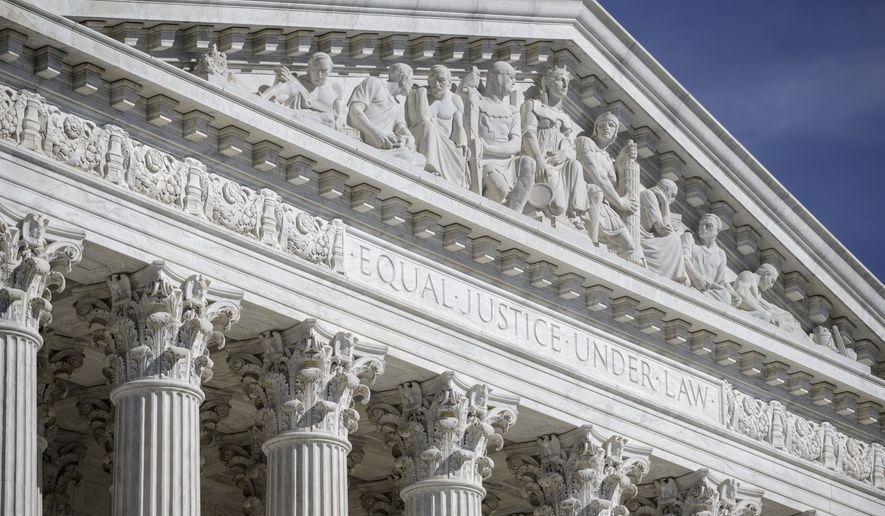The Supreme Court on Monday rejected President Obama’s “accommodation” for religious nonprofits seeking to avoid complicity in their female employees’ birth control choices under Obamacare and sent both sides back to try to work out a better compromise.
In an unsigned order, the justices said they believe there is a way to get contraceptive coverage for women without forcing religious hospitals, schools and other charities that employ them to violate their own moral teachings, and they asked lower appeals courts to oversee the efforts to reach a deal.
“Both petitioners and the government now confirm that such an option is feasible,” the court said, citing both sides’ responses after the justices prodded them earlier this year.
Religious liberty advocates called the ruling a victory, while Mr. Obama and his allies took it as a defeat.
If the court had nine members, administration officials said, the decision might have been different.
“I won’t speculate as to why they punted, but my suspicion is that if we had nine Supreme Court justices instead of eight, then they wouldn’t have punted,” Mr. Obama said in an interview with BuzzFeed as he tried to pressure the Senate to confirm his nominee to fill the seat of the late Justice Antonin Scalia.
The contraception mandate in the Affordable Care Act has been controversial from the start. Religious groups such as the Little Sisters of the Poor, an elder-care charity run by nuns, say they want to avoid having their employee insurance pay for access to artificial contraceptives that violate church teachings.
Houses of worship are already exempt, but the administration has struggled with treatment of religiously affiliated charities. The administration eventually offered a compromise: Nonprofits wouldn’t have to pay for coverage but would still have to fill out a form alerting their insurers of their objections, which served as a trigger for the insurers to provide contraceptive coverage at no cost to the nonprofits through the same plans.
The Little Sisters and other faith-based groups said even signing the form made them complicit because their plans still included the contraceptives. The charities said that violates their rights under the Religious Freedom Restoration Act, which requires the government to use the least-intrusive means of imposing its will when religious liberty is implicated.
The justices said their ruling doesn’t prejudge any of those issues. Instead, the court said it sees the chance for both sides to work out something else.
In an unusual move, several weeks after oral arguments, the justices invited a new round of briefs from both sides in the case and specifically suggested a compromise: religious nonprofits that object to contraception could tell their insurers that they don’t want their plans to cover methods to which they object on religious grounds.
Attorneys for the nonprofits said insurers could offer stand-alone contraceptive plans that individuals could buy on Obamacare’s exchanges. The Obama administration rejected that as unworkable and tried to wave aside the court’s suggestion, saying it was possible but tricky.
The justices seemed unmoved by the objections.
“Although there may still be areas of disagreement between the parties on issues of implementation, the importance of those areas of potential concern is uncertain, as is the necessity of this court’s involvement at this point to resolve them,” the justices wrote.
The justices said there is precedent for sending a case like this back to lower courts for more work. But in this instance, at least four appeals courts heard challenges and were split in their rulings.
That could make agreement among all sides more difficult, and the case could end up back before the justices.
Reaction to Monday’s order largely fell along party lines.
The White House said it planned to fight for its mandate. Democratic allies said women deserve to have their insurance cover birth control no matter who their employers are.
Top Republicans, meanwhile, said religious nonprofits should have the same type of blanket exemption given to churches, synagogues and mosques.
“The Little Sisters deserve more than a victory in court. The Sisters deserve relief from this mandate and an end to this ordeal,” said House Speaker Paul D. Ryan, Wisconsin Republican. “The administration should resolve this as soon as possible so the Sisters can go on serving the poor in peace as they have for so long.”
The White House noted that Monday’s decision keeps the current system in place. But the Supreme Court said all of the nonprofits whose challenges were part of the ruling will not be subject to penalties while their cases are pending.
• Tom Howell Jr. can be reached at thowell@washingtontimes.com.




Please read our comment policy before commenting.